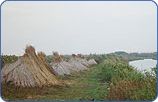
|
|
The World Bank-GEF Investment Fund is the investment arm of the GEF Strategic Partnership on the Danube/Black Sea Basin. The objective of the Investment Fund (IF) is to provide a focused regional framework for country level investments aimed at a common goal of combating eutrophication in the Black Sea and help jump start and further accelerate key investment in sectors such as municipal waste water, agricultural and industrial pollution. Eligible areas of intervention for support under the Fund include investments to remediate and mitigate nutrient pollution in municipalities, industry and agriculture, as well as policy and legal reform and capacity building for enhanced monitoring and enforcement. |

|
|
The Partnership Investment Fund for Nutrient Reduction is funded by GEF for a total of US$70 million over multiple tranches and it is assisting to the 14 recipient countries in the Danube ? Black Sea Basin, these are Belarus, Bosnia-Herzegovina, Bulgaria, Croatia, Czech Republic, Georgia, Moldova, Romania, Russia, Serbia and Montenegro, Slovakia, Slovenia, Turkey and Ukraine. The Investment Fund is funding investments in nutrient reduction as part of domestic and industrial wastewater treatment, agricultural pollution control and wetland restoration projects in individual countries. At current time the portfolio consists of 13 projects of which two are under implementation, five under advanced preparation using GEF PDF-B grants, four pending The Investment Fund portfolio includes 12 projects in 10 of the recipient countries. Four of these projects are under implementation and the rest at various stages of preparation. |
|
|
|
ROMANIA AGRICULTURAL POLLUTION CONTROL |
|
|
|
Time frame: 12/13/2001 - 06/30/2007 The key objective is to increase significantly the use of environmentally-friendly agricultural practices in the project area and thereby reduce nutrient discharge (nitrogen and phosphorus) from agricultural. In support of this objective, the project will assist the Government of Romania to: (i) promote the adoption of environmentally-friendly agricultural practices by farmers' associations, family farms and individual farmers in the Calarasi Judet (county); (ii) promote ecological sustainable land use and management in the Boianu-Sticleanu Polder, and ecological restoration of the neighboring Calarasi-Raul Polder to act as a filter and reduce nutrient discharge to the Danube; (iii) strength national policy and regulatory capacity; and (iv) promote public awareness and mechanisms for replicability. |
|
|
|
BULGARIA WETLANDS RESTORATION AND NUTRIENT REDUCTION |
|
|
|
Time frame: 06/13/2002 - 03/15/2008 Key project objective is to support local communities in Persina Nature Park and demonstrate how environmentally friendly agriculture can improve their livelihoods. In support of global environmental goals, the project seeks to replicate successful efforts to reduce transboundary nutrient loading and other agricultural pollution that flow through Danube into the Black Sea. The first wetlands restoration project under Strategic Partnership for Nutrient Reduction in the BS and Danube Basin, which aims to help countries undertake investments to control or mitigate nutrient inflow to BS. |
|
|
|
MOLDOVA AGRICULTURAL POLLUTION CONTROL |
|
|
|
Time frame: 02/26/2004 - 12/31/2009 The development objectives is to increase significantly the use of environmentally-friendly agricultural practices by farmers and agro-industry in Moldova, in order to reduce nutrient discharge from agricultural sources to the Danube River and the Black Sea. In support of this, the project will assist to: (i) promote adoption of environmentally-friendly practices in crop and livestock production in rural agro-industries that contribute to nutrient pollution, including wetland and integrated watershed management; (ii) strengthen national policy, regulatory and institutional capacity for agricultural nutrient pollution control; (iii) promote a broad public awareness campaign and replication strategy. The Project would be a component of a US$30million, IDA funded Rural Investment and Services Project (RISP) and will mainstream environmental concerns into agricultural practices. It would also assist Government in harmonizing its legislative framework with relevant (EU) directives and in honoring its international commitments to reduce nutrient loads to the Danube. |
|
|
|
TURKEY ANATOLIA WATERSHED REHABILITATION PROJECT |
|
|
|
(Formerly Called Agricultural Pollution Control) Time frame: 06/01/2004 - 05/15/2010 The overall development objective is to support sustainable natural resource management practices in 28 microcatchments in Anatolia and Turkey's Black Sea regions, and thereby raise incomes of communities affected by resource degradation. The global environmental objective is to introduce farming practices which will reduce the discharge of agricultural nutrients into surface and ground water in watersheds draining into the Black Sea in four provinces. The project will help introduced improved manure and nutrient management practices as well as organic farming, which over the long run, will help reduce the discharge of nitrogen and phosphorus into the surface and ground waters of Turkey and the Black Sea. |
|
|
|
HUNGARY NUTRIENT REDUCTION |
|
|
|
Time frame: 10/27/2005 - The objective is to decrease nutrients discharges into Danube river and loads to Black Sea by improving reduction of nutrients in effluent from wastewater treatment plants at Budapest and Dunaujvaros and increasing nutrient retention capacity at Danube-Drava National Park's Gemenc and Beda-Karapancsa Region. The project will complement the Government of Hungary in its efforts to reduce transboundary pollution in the Danube, and will lead also to necessary policy, institutional and legal reforms related to regional nutrient reduction and improved water quality management. |
|
|
|
RUSSIA KRASNODAR AGRICULTURAL POLLUTION CONTROL |
|
|
|
Time frame: 09/05/2006 The overall objective of the Krasnodar Black Sea Agricultural Nutrient Reduction Project is to reduce nutrient (nitrogen and phosphorous) pollution from agricultural sources in Krasnodar Krai to the Black Sea. In support of this objective, the project would assist the Government of the Russian Federation to: (i) promote the adoption of environmentally-friendly practices in crop and livestock production, including organic farming; (ii) strengthen national policy, regulatory and institutional capacity for agricultural nutrient pollution control; and (iii) promote a broad public awareness campaign to disseminate the benefits of the proposed project activities and develop a replication strategy. |
|
|
|
CROATIA ZAGREB MUNICIPAL NUTRIENT REDUCTION |
|
|
|
Time frame: 01/21/2005 The overall objective of the proposed project is to reduce discharge of nutrients into River Sava. Through the project, improving the reduction of nutrients in effluent from wastewater treatment plant in Zagreb, the regional development objective, i.e. to decrease nutrients in the River Sava and by this way nutrient loads in River Danube and to BS, can be achieved. The objective of this project go beyond Croatian legal requirements and are clearly at the protection of the BS under the Partnership Program. |
|
|
|
SERBIA DANUBE RIVER ENTERPRISE POLLUTION REDUCTION PROJECT |
|
|
|
Time frame: July 2005 - July 2009 The development objective of the project is to increase prevalence of environmentally friendly practices among eligible enterprises and thereby reduce nutrient pollution of the Danube River. It will also aim to build capacity to improve environmental management. The global environment objective is to demonstrate measures for reducing reduce nutrient pollution of the Danube River and the Black Sea. The project will also help the Republic of Serbia attain its goal of harmonizing its environmental management practices with those of the European Union. |
|
|
|
BOSNIA WATER QUALITY PROTECTION |
|
|
|
Time frame: 04/12/2005 The global objective is to reduce pollution in the Adriatic Sea and the Danube basin by reducing nutrient loads from municipal wastewaters that are discharged in the Neretva and the Bosnia rivers. To achieve this objective the project will support: (a) development of a water quality management plan to be used as a guide for future water management decisions; (b) establishment of a joint Bosnia/Croatian Commission with coordination from Montenegro to implement the plan; and (c) development and implementation of high priority, low cost water capital investments. |
|
|
|
MOLDOVA ENVIRONMENTAL PROTECTION |
|
|
|
Time frame: 11/20/2005 The overall objective is to improve the Dnister River water quality as well as environmental quality in the Dnister River Basin. The project would assist Moldova and Ukraine to begin the development of a Transnational Dnister River Basin Management System. The municipal wastewater is the principal source of pollution of the Dnister River and particularly as an emitter of phosphorus and nitrogen substances that are responsible for the stimulation of aquatic plants and contribution to the Dnister River and Black Sea eutrophication. |






